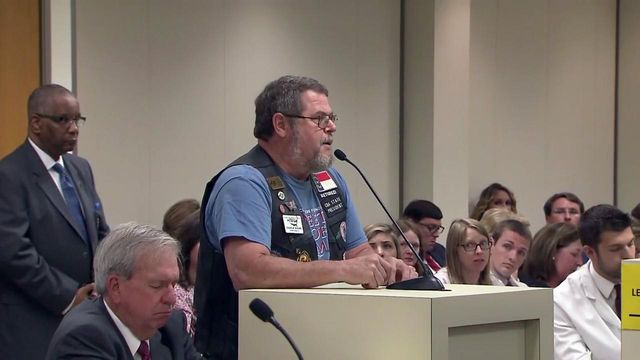Motorcycle helmet repeal finally rolling in House
Two weeks after it was voted down in a House committee, a measure partially repealing North Carolina's requirement that motorcycle riders wear helmets resurfaced Thursday and squeaked through that same committee.
Posted — UpdatedThe House Transportation Committee voted 14-12 along party lines in favor of House Bill 267. The bill must go through another two committees before reaching the House floor.
The bill would require helmets for riders younger than 21 but would allow those 21 and older the option of riding without a helmet.
"It's not a matter a wearing a helmet or not wearing a helmet. It's just a matter of does a state tell you to wear it," said sponsor Rep. John Torbett, R-Gaston. "I profess that the state should not tell you."
"I just can't believe we're here discussing this," said Rep. Ray Russell, D-Watauga, noting the U.S. Centers for Disease Control and Prevention has done studies showing that motorcycle helmets save lives.
"If we allow this to pass, people will die. That's a 100 percent chance," Russell said.
Charlie Boone, legislative director of the Concerned Bikers Association, noted that 31 other states already allow adult riders to choose whether or not to wear a helmet.
"If you're really concerned about motor vehicle deaths, there are thousands more head injuries and deaths in auto accidents every year, so why aren't you asking for a helmet law for people in cars?" Boone said.
Torbett suggested that lawmakers wouldn't be so quick to require helmets if they had to put one on every time they got into their cars or other four-wheeled vehicles.
"For those who choose to ride on two wheels, the option's not gone away. We're not saying, 'Don't wear a helmet.' We're just saying you have a choice to," he said.
Tag readers on state highways
The committee also approved a bill that would allow license plate readers to be placed along state highways, despite privacy concerns voiced by several lawmakers.
Sponsor Rep. John Faircloth, R-Guilford, noted plate readers have been used in North Carolina for several years in local communities, but that limits law enforcement's ability to capture suspected criminals.
Faircloth, a retired police chief, said allowing readers on state highways would increase hits "on the bad guys we're looking for" based on the tags of the vehicles they're driving by an estimated 66 percent.
Rep. Michael Speciale, R-Craven, predicted the plate readers would eventually be used to track people's movements.
"Once we crack that door, you will have these things all over the place, and they will be able to track you – where you're going, what time you got there, the whole nine yards," Speciale said, adding that police could use the readers in patrol cars instead of stationing them on the sides of roads.
Rep. Dana Bumgardner, R-Gaston, noted that license plate numbers could easily be linked with driver information in Division of Motor Vehicle databases.
"This is just more tracking of people who haven't done anything, who are just minding their own business," Bumgardner said. "This is the beginning of everywhere you go and everything you do, you're being tracked and followed and surveilled."
Rep. Allen McNeill, R-Randolph, a former sheriff's deputy, said the notion that plate readers "are tracking everybody is ridiculous." Law enforcement must get a judge to sign off on a search warrant to access data from a reader, he said, meaning only specific information relevant to an investigation could be obtained.
Related Topics
• Credits
Copyright 2024 by Capitol Broadcasting Company. All rights reserved. This material may not be published, broadcast, rewritten or redistributed.






